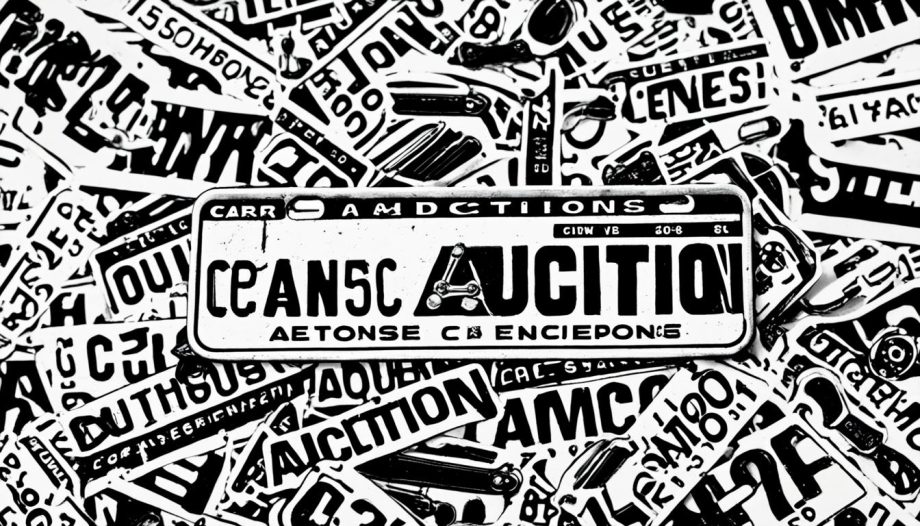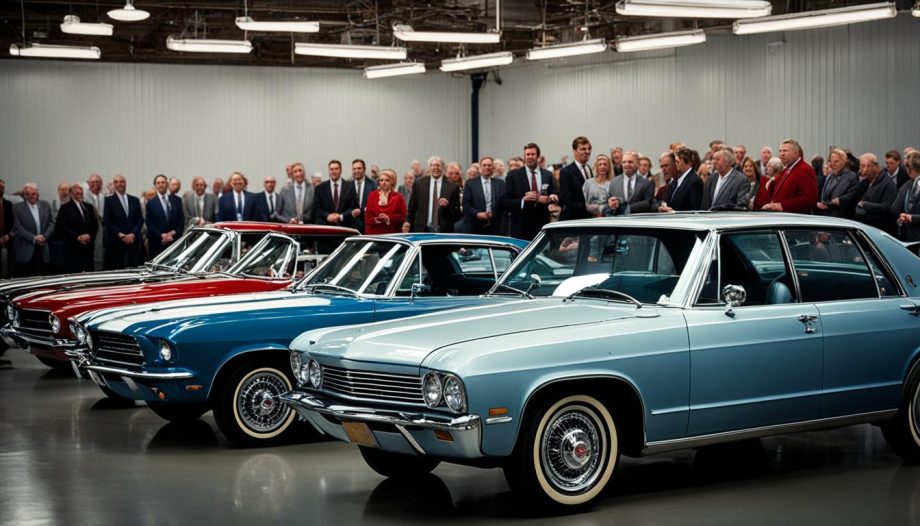In the world of car auctions, ACV is a term that often comes up. But what exactly does ACV mean? ACV stands for Actual Cash Value and it plays a crucial role in determining the worth of a vehicle in the auction market.
When it comes to car auctions, understanding and utilizing ACV can make all the difference in your buying or selling experience. In this article, we will explore the significance of ACV in car auctions and how it affects both buyers and sellers. So, let’s dive in and discover the ins and outs of ACV!
What is ACV and Why is it Important in Car Auctions?
In the world of car auctions, understanding the concept of ACV, or Actual Cash Value, is crucial. ACV represents the fair market value of a vehicle, serving as a key factor in determining its price and guiding buyers and sellers in making informed decisions.
ACV is calculated based on various factors such as the age, condition, mileage, and market demand of the vehicle. By considering these aspects, car auction participants can assess the true worth of a vehicle and set realistic expectations for its sale or purchase.
Why is ACV so important in car auctions? Let’s explore:
- Pricing Accuracy: ACV enables buyers and sellers to accurately price vehicles, ensuring that they are neither overpaying nor underselling their assets. Knowing the ACV helps establish a fair starting point for negotiations, promoting transparency and trust among all parties involved.
- Bidding Strategy: Understanding the ACV empowers bidders to make strategic decisions during the auction. By assessing the ACV of a vehicle, bidders can determine the maximum amount they are willing to bid, leading to more efficient and successful auction outcomes.
- Market Insights: ACV provides valuable insights into the current market trends and demand for specific vehicle types. By staying informed about ACV, participants can adapt their auction strategies based on market conditions, ultimately increasing their chances of securing favorable deals.
With ACV serving as a yardstick for vehicle valuation, car auctions become more transparent and efficient. Buyers and sellers can confidently navigate the auction process, knowing that they are making well-informed decisions backed by accurate and reliable information.
Stay tuned for the next section, where we’ll discuss how buyers benefit from knowing the ACV in car auctions.
How Buyers Benefit from Knowing the ACV in Car Auctions
As buyers in car auctions, understanding the ACV (Actual Cash Value) can provide valuable advantages and empower us to make informed decisions. Knowing the ACV allows us to set a realistic budget and avoid overpaying for vehicles. With this crucial information, we can confidently assess the value of a vehicle and negotiate prices more effectively.
Setting a Budget:
Knowing the ACV helps us establish a budget that aligns with the market value of the cars we are interested in. By having a clear understanding of the ACV, we can avoid overspending or bidding beyond our means. This knowledge ensures that we make sensible financial decisions and prevents unnecessary financial strain.
Assessing Vehicle Value:
Understanding the ACV allows us to evaluate the worth of a vehicle accurately. We can compare the asking price of a car at auction with its estimated value, which eliminates the risk of getting caught up in the excitement of bidding and overspending. By referring to the ACV, we can make a fair judgment about the condition, make, model, and year of the vehicle, ensuring that we pay a reasonable price for the car’s actual worth.
Negotiating with Confidence:
Armed with the knowledge of the ACV, we gain confidence in negotiating prices with sellers at car auctions. We can leverage our understanding of the true value of a vehicle to arrive at a mutually beneficial agreement. This advantage allows us to negotiate from a position of strength, increasing the chances of securing a good deal.
By utilizing the ACV, we can navigate car auctions with a buyer’s advantage. This valuable information empowers us to set a budget accurately, evaluate the worth of vehicles, and negotiate prices effectively. With the ACV as our guiding reference, we can approach car auctions with confidence, knowing that we are making informed decisions and maximizing our chances of finding the best deals.
| Buyer’s Benefits of Knowing the ACV in Car Auctions |
|---|
| – Ability to set a realistic budget and avoid overpaying |
| – Accurate assessment of the value of a vehicle |
| – Increased confidence in negotiating prices with sellers |
| – Maximizing chances of finding the best deals |
How Sellers Benefit from Knowing the ACV in Car Auctions
As sellers, understanding the ACV (Actual Cash Value) in car auctions can provide numerous advantages and greatly enhance your selling experience. By having a clear understanding of the ACV, you can effectively set a realistic asking price for your vehicle, attract potential buyers, and ultimately maximize your profits.
“Knowing the ACV allows sellers to align their asking price with market trends, ensuring that they are not overvaluing or undervaluing their vehicle. This helps to build trust with potential buyers and increases the chances of a successful sale.”
One of the key benefits of knowing the ACV is the ability to attract potential buyers. Transparency is highly valued in the car auction process, and by pricing your vehicle in line with its actual value, you can generate interest and inquiries from serious buyers who are willing to pay a fair price.
Moreover, understanding the ACV empowers sellers during negotiations, as they can confidently justify their asking price based on accurate market information. This knowledge allows sellers to negotiate from a position of strength, increasing the likelihood of reaching a favorable deal.
Using ACV in Marketing Strategies
Incorporating the ACV into your marketing strategies can also give you a competitive edge. Highlighting that your vehicle is priced according to its actual value can attract discerning buyers who prioritize transparency and fairness.
- Create compelling advertisements that mention the ACV to grab buyers’ attention.
- Utilize online platforms and social media to showcase the competitive pricing of your vehicle.
- Mentioning the ACV in sales pitches and descriptions can help establish credibility and build trust with potential buyers.
Enhancing Negotiating Tactics
Knowing the ACV can significantly improve your negotiating tactics. It allows you to confidently counter low offers by providing data-driven justification for your asking price. Buyers will be more inclined to offer a fair price when they understand that you have done your homework and priced your vehicle accordingly.
Additionally, by being aware of the ACV, sellers can set their reserve price at a level that ensures a satisfactory return on investment. This helps prevent the vehicle from selling below its true value.
| Benefits of Knowing the ACV in Car Auctions for Sellers: |
|---|
| 1. Accurate pricing leads to increased interest and inquiries from potential buyers. |
| 2. Enhances credibility during negotiations, resulting in favorable deals. |
| 3. Provides a competitive advantage by incorporating the ACV in marketing strategies. |
| 4. Enables confident negotiating tactics backed by data-driven justifications. |
| 5. Allows setting a reserve price that ensures a satisfactory return on investment. |
By leveraging the power of ACV in your selling efforts, you can position yourself for success in car auctions. Not only will you benefit from increased buyer interest and favorable negotiations, but you’ll also have the assurance of setting a fair asking price. Understanding the ACV truly opens up new opportunities and maximizes your advantage as a seller in the dynamic world of car auctions.
How ACV Can Impact the Car Auction Process
Understanding the ACV (Actual Cash Value) of a vehicle is crucial when it comes to participating in car auctions. Not only does it provide valuable insights into the fair market price of a vehicle, but it also plays a significant role in shaping the dynamics of the auction process itself.
One of the key ways that ACV impacts car auctions is through the bidding strategies employed by buyers. Armed with knowledge of the ACV, buyers can make more informed decisions on the maximum price they are willing to pay for a vehicle. This helps to prevent overbidding and ensures a fair and competitive bidding environment at the auction.
The ACV also influences the competition among buyers. When the ACV is known and transparent, it levels the playing field, allowing all buyers to have equal access to the value information of the vehicle. This creates a more balanced competition, where buyers can compete based on the quality of their bids rather than on who has the most insider information.
Furthermore, the ACV affects the overall pricing dynamics at car auctions. By providing a benchmark price, it sets the foundation for negotiations and drives the initial bidding. The ACV acts as a reference point for buyers and sellers, guiding their expectations and shaping the final sale price of the vehicle.
When it comes to financing options for vehicles purchased at auctions, the ACV also plays a significant role. Lenders often rely on the ACV to determine the maximum loan amount they are willing to extend to a buyer. A higher ACV can lead to more favorable financing terms, providing buyers with greater flexibility and affordability.
Similarly, insurance coverage for vehicles purchased at auctions may be influenced by the ACV. Insurance providers may use the ACV as a basis for determining premiums and coverage policies. Buyers who have a solid understanding of the ACV can ensure they have the appropriate insurance in place to protect their investment.
Overall, the ACV has a profound impact on the dynamics of the car auction process. From shaping bidding strategies and competition among buyers to influencing pricing dynamics and financing options, understanding the ACV is essential for both buyers and sellers. By leveraging the power of ACV, participants in car auctions can make informed decisions and navigate the auction process with confidence.

Tips for Using ACV Effectively in Car Auctions
When it comes to maximizing your potential in car auctions, understanding the ACV (Actual Cash Value) of a vehicle is crucial for both buyers and sellers. Here are some valuable tips to help you make the most of the ACV information:
1. Research ACV Values: Before participating in a car auction, take the time to research the ACV of the vehicle you are interested in. This will give you an idea of its market worth and help you set realistic expectations for bidding or pricing.
2. Leverage Online Resources: Utilize online tools and resources that provide ACV data for different makes and models. These platforms can offer valuable insights into the current market trends, allowing you to make informed decisions when buying or selling.
3. Partner with Professionals: Consider partnering with professionals who have experience in car auctions and can provide expert guidance. Auction consultants, appraisers, and car dealerships can offer valuable advice and ensure you navigate the auction process with confidence.
4. Stay Updated on Market Trends: Keep an eye on the latest market trends and factors that may impact ACV values. Economic conditions, industry news, and changes in demand can all influence the prices at car auctions. By staying informed, you can adjust your strategies accordingly and increase your chances of success.
By following these tips, buyers and sellers can effectively utilize ACV information to make informed decisions and achieve favorable outcomes in car auctions. Remember, knowledge is power, and understanding the ACV is an essential tool in the competitive world of car auctions.




